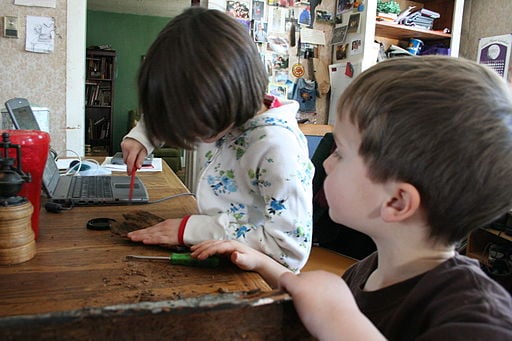I’m an evangelical, homeschooling, anti-choice woman. And with that description, you may think you know a lot about me and my understanding of abortion.
I’m also a feminist who is against the death penalty, voted for Ralph Nader every time that was an option, and supported Obama in each of the last two elections. And with that description, you may think you know a lot about me and my understanding of abortion.
But contrary to the description of evangelicals found in Bob Seidensticker’s post about abortion today, I don’t fall neatly into anybody’s abortion box. Neither do most of the people I know.
Today, I’ll briefly address a few of the comments in Bob’s piece, and then tomorrow I’ll say more about my own understanding of abortion.
1) Bob writes that “..the pro-life argument does seem a bit like a game, despite the serious consequences. The Slactivist blog and Valerie Tarico’s blog have shown that today’s foaming-at-the-mouth pro-life stance by evangelicals was not held by their predecessors 30 years ago.”
Leaving aside the nasty tone of the comment (which makes it hard for us to really talk to and hear one another), the fact that most evangelicals felt differently about abortion in the past is not relevant to whether or not it’s immoral. After all, fifty years ago plenty of evangelicals also supported anti-miscegenation laws.
The specific arguments that some evangelicals have made in the past to support abortion rights, however, are interesting and demand an answer from today’s anti-choice advocates. So instead of mocking us as though we have never heard this critique before, you might ask sincerely, “What has changed in your thinking and why?”
2) Bob writes that “I’ve raised babies (with help, of course), and that makes me something of an expert in identifying babies. As an expert, let me assure you that a single invisible cell isn’t a baby.”
I re-read this section a few times, trying to decide if he was being facetious and I’m still not sure. Is he really claiming to be an expert on when life begins because he is a father? Or is he mocking those who claim to be experts on when life begins so that they can make abortion illegal? Either way, the statement misses the essential point for many of us. I’m not looking for an expert – on either side of the debate. I want to hear the voice of God. I understand that many fellow citizens have no such desire. I respect that and understand that means that we come to the conversation from different starting points. The difference, though, is not about precisely when life begins. The fundamental difference is that I want my heart to be shaped by God’s heart and he believes no such God exists.
You may wonder, then, how we can have conversations about abortion. After all, if every time you make a well-reasoned argument I say, “Well, that’s not what God told me,” we’re not gonna make much progress. But I believe that God reveals himself in many ways, including but not limited to science and experience. I believe that God can reveal his truth to me through a clear argument made by Bob. It’s just that I will see Bob’s arguments and experience, when they are convincing, as the result of truth, not the source of it.
I discount neither Bob’s experience of fatherhood, nor his feeling that when his children were zygotes they were not babies. Nor do I discount my own experience as the mother of five children: one whom I aborted in college, one of whom I delivered stillbirth, two of whom were born alive and are named Zach and Ezra, and one of whom moved in with us two years ago when her mother died. All of those experiences, and my evolving relationship with God over the years, have shaped my understanding of abortion. But our experience, neither his nor mine, does not make us experts on anything other than our own experience.
We need to go into the conversation understanding that there is no easy way for us to make collective decisions about abortion. One man’s expert is another woman’s hack. Even a clear scientific definition of what constitutes a baby will not bring us to consensus. His post implies that this is precisely what he finds frustrating, but I don’t think there’s a way around it and I’m okay with that.
3) He writes, “An acorn is not a tree, a silkworm is not a dress, a water molecule is not a whirlpool, a piece of hay is not a haystack, and 20 chicken eggs are not a henhouse of chickens. Similarly, a single fertilized human egg cell is very different from a one-trillion-cell newborn baby.”
Yup. That’s true. And I don’t know a single person who disagrees. But that hardly settles the question. Thoughtful Christians often disagree about precisely when life begins and still advocate an anti-choice position. (See Tim Dalrymple’s piece for an example of this thinking.) Third-wave feminist Naomi Wolf wrote in Misconceptions that her experience of pregnancy and her research about the modern commodification of fetuses complicated rather than solidified her understanding of abortion. Acknowledging that there is a spectrum of meaning between zygote and college graduate does not mean, as Bob suggests, that one would need to be pro-choice.
The funny thing is that I often hear anti-choice advocates using his line of thinking against the pro-choice position. “If you are pro-choice because there is some time before which homo sapiens are not babies worthy of protection,” anti-choice advocates wonder, “how will you define when that time is? Is it at birth? Why? Why not a day before birth? Or three months before birth? What about after birth but before the umbilical cord is cut? Why not a couple weeks after birth? What’s the difference? And who are you to decide?”
I find those arguments against abortion frustrating for the same reasons I find Bob’s argument frustrating. The truth is that few of us can make a consistent argument here. Except for the Peter Singers of the world, most of us are profoundly uncomfortable with abortion at eight months. Except for Catholics, very few of us are uncomfortable with condoms. Despite hist post’s tone, I imagine that Bob, like many of us, has a hard time knowing for certain when human life begins and when it is wrong to limit the potential of life to blossom.
That doesn’t mean that I think arguments can’t be made for and against abortion. It just means that I don’t think that church history, experts, or truisms will serve as trump cards in those arguments. They don’t carry the day because the abortion box that Bob tries to construct, and that too many anti-choice proponents try to construct, isn’t big enough for real people to fit in.











